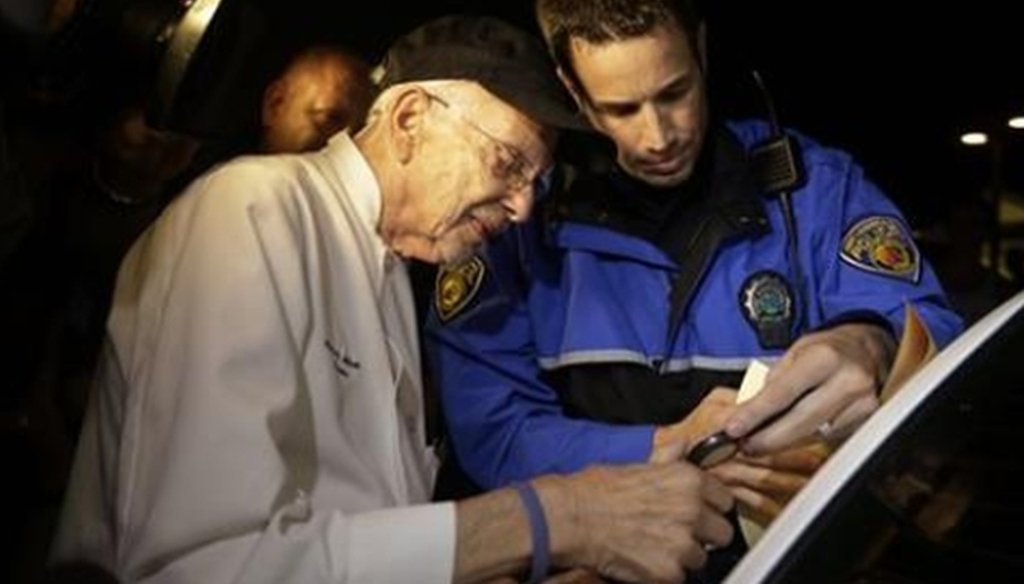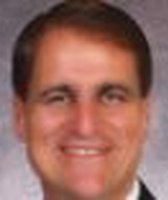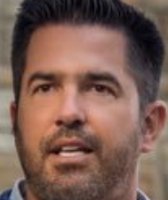Stand up for the facts!
Our only agenda is to publish the truth so you can be an informed participant in democracy.
We need your help.
I would like to contribute

Arnold Abbott, 90, gets fingerprinted by police during his Nov. 5 arrest for violating the city's ordinance about rules for feeding the homeless outdoors. (AP)
Jack Seiler says Arnold Abbott, 90-year-old, wasn't taken into custody for feeding homeless
The city of Fort Lauderdale’s latest attempt to regulate outdoor homeless feedings made international news when police nabbed "Chef Arnold" -- a 90-year-old caught in the act of such a public feeding.
"One of the police officers said, 'Drop that plate right now,' as if I were carrying a weapon," Arnold Abbott said, recalling his early November arrest for the Associated Press.
Multiple news reports -- and Comedy Central’s The Colbert Report -- recounted the tale of Abbott’s arrest, which reignited a long-running debate about how the city should handle the homeless population downtown and at the beach.
On Nov. 5, Fort Lauderdale Mayor Jack Seiler issued a statement in which he said he wanted to "set the record straight" about the city’s services for homeless. He said that the media had misrepresented the facts.
"Contrary to reports," Seiler wrote, "the City of Fort Lauderdale is not banning groups from feeding the homeless."
Seiler said outdoor feeding is legal, but added that a new city law regulates the activity.
Then Seiler addressed the situation regarding Abbott:
"At two recent outdoor food distributions, citations were rightly issued for non-compliance with the process enacted to ensure public health and safety. Contrary to what was reported in the media, no one was taken into custody. ..."
As the public-relations crisis escalated, Seiler gave multiple interviews to the media.
On CNN Nov. 11, Seiler said Abbott "was not arrested and taken into custody."
At PolitiFact Florida we agree with Seiler’s goal of setting the record straight. Was Abbott taken into custody?
Fort Lauderdale’s laws about the homeless
Abbott’s battle with the city has brought notoriety to Seiler, a former state representative who has been mentioned as a future statewide candidate for the Democrats. Seiler faces re-election to a third term in March. So far, no one has filed to run against him.
Abbott, who founded an interfaith volunteer organization Love Thy Neighbor to help the homeless, has been battling city leaders for more than a decade. In 1999, the city tried to ban him from holding picnics for the homeless at the beach, offering him an alternative site miles away from downtown. But Abbott prevailed in court when a judge ruled that the city had violated his religious rights and that the city’s new location was too remote. Abbott resumed his feedings and resumed them in visible locations in Stranahan Park in downtown and along the beach.
The battle has continued in recent years, with the commission passing a series of laws that attempted to regulate the homeless population, including a ban on soliciting for money at intersections and tougher laws against defecating in public.
City officials, including Seiler, have argued that while the homeless should have access to services, including meals, they have heard complaints from some businesses and residents about the homeless population in downtown.
Advocates have decried city officials for cracking down on the homeless with a series of laws. At an Oct. 21 meeting, the commission approved the ordinance about outdoor food distribution over the objection of protesters.
The ordinance, approved by the Commission 4-1, codified a list of rules for outdoor food distribution, including that sites must be 500 feet away from residential areas, have bathrooms or portable toilets, equipment for hand washing and consent of the owner. The law allows indoor feedings at houses of worship.
"You have to balance the interests of everybody in the community," Seiler told PolitiFact Florida. "What we always try to do is make sure everybody gets to enjoy our parks. Every single thing we have done with the ordinance is a balance."
But while the law itself doesn’t technically ban outdoor feedings, it raises the bar for groups such as Abbott’s in a way that makes it almost impossible to clear. (Abbott argues that the requirement that he get a port-a-potty should be moot since a public restroom is nearby and he says volunteers wash their hands before feedings and use gloves.)
Featured Fact-check
At the time of Seiler’s statement, Abbott had three run-ins with law enforcement related to the outdoor feedings: on Oct. 6, Nov. 2 and Nov. 5, police reports show. (The October arrest predated the new ordinance but the city already had a separate law banning social services in the parks.)
On the first two occasions, Abbott was given a warning but then continued with the feedings. The third time, Abbott agreed to end the food distribution that day, police reports say.
In none of the three instances was he handcuffed or taken to jail. Instead, he was given notices to appear in court. (In one police report, it states that Abbott shook the police officer’s hand before he left.) At least one other person helping with the feedings was also arrested in a similar manner.
A city spokesman told PolitiFact Florida that the case stemming from the Nov. 2 arrest has been filed in court.
The city has generally avoided referring to Abbott’s case as an "arrest," but his attorney John David said that just because it’s not a "custodial arrest" doesn’t mean it’s not an arrest. For minor crimes, police use this type of arrest and give defendants notices to appear as long as the person has a connection to the area and is likely to show up in court.
Nonetheless, "it's an arrest, no doubt about that," David said. "He is charged with a criminal offense."
Fort Lauderdale police Capt. Rick Maglione told PolitiFact Florida that "It is similar to a misdemeanor arrest, but we do not have to take the person physically into custody and they can just show up in court and let a judge decide the case."
We interviewed a few criminal defense lawyers in South Florida not involved in the case and they agreed that the police did indeed arrest Abbott.
"With all due respect to the mayor, it is an arrest," said Brian Tannebaum, a Miami criminal defense lawyer. "The fact that someone is not taken into custody does not make it something other than an arrest. Misdemeanor cases are handled with promises to appear all the time. The officer has discretion to take someone into custody, but even if they don't it is still considered an arrest."
City spokesman Chaz Adams told PolitiFact that although a notice to appear is technically an arrest, "the mayor has been consistent in saying that Mr. Abbott was not "arrested and taken into custody."
Abbott faces up to a $500 fine and 60 days in jail for each offense. However, lawyers say it’s unlikely that a judge will throw him behind bars.
"I can’t imagine anyone putting Arnold in jail," said Broward public defender Howard Finkelstein. His office is not handling the case, but he has praised Abbott.
Abbott’s lawyer filed a motion in Broward court on Nov. 12 that asked a judge to enforce the injunction from the earlier case that allowed Abbott to continue the feedings. The city offered Abbott two alternative sites -- at the city’s aquatic complex near the beach, and at Church by the Sea, located near the beach -- but he rejected both.
"I plan to continue my feedings at the same site I have used for the past 23 years," Abbott told PolitiFact Florida in an email.
Seiler says it’s not his call what penalty Abbott faces.
"We have to enforce the laws, we have to be consistent," Seiler told PolitiFact Florida. "What the courts do with Mr. Abbott -- that’s up to the courts."
Seiler has defended his city’s reputation for serving the homeless, which includes working with nonprofits to provide services and allowing the county-run Homeless Assistance center to expand. The city’s police department also has a homeless outreach unit.
Fort Lauderdale’s law about feeding the homeless is part of a growing national trend.
Since 2007, 71 cities have attempted or enacted some type of rules related to food-sharing activities, according to the National Coalition for the Homeless.
"The best solution to the food-sharing issue is to have indoor meal programs available to the homeless three times a day, seven days a week," said Michael Stoops, director of community organizing National Coalition for the Homeless. "If these locations were located conveniently in Downtown Fort Lauderdale, a good number of the homeless would opt to eat inside vs. outside. However, food-sharing with the homeless in public spaces would still be needed."
Our ruling
Seiler said that "no one was taken into custody" for feeding the homeless.
Seiler is correct that Abbott wasn’t taken into custody -- the activist was not handcuffed or taken to jail but was instead given a notice to appear in court. But his carefully worded claim glosses over the fact that Abbott was indeed arrested on more than one occasion for allegedly feeding the homeless in violation of city ordinances, something that leaves Abbott at least theoretically in peril of being sentenced to jail.
Seiler’s claim is accurate but needs clarification or additional information, so we rate it Mostly True.
Our Sources
Fort Lauderdale Police Department, Notice to Appear for Arnold Abbott for feeding the homeless, Oct. 6, Nov. 2 and Nov. 5
City of Fort Lauderdale, "Setting the record straight on the city’s homeless initiatives," Multiple updates since Nov. 5, 2014
City of Fort Lauderdale, Ordinance about feeding the homeless, Oct. 22, 2014
Stephen Colbert, Colbert Report, Nov. 7, 2014
Sun-Sentinel, "Fort Lauderdale commissioners pull all-nighter and approve homeless feeding restrictions," Oct. 22, 2014
Associated Press, "Feeding the homeless: Act of charity or a crime?" Nov. 5, 2014
Washington Post, "Fort Lauderdale cracks down on feeding homeless in public, arrests 90-year-old man who did it anyway," Nov. 5, 2014
The Independent, "Arnold Abbott: 90-year-old man vows to keep feeding the homeless despite facing jail," Nov. 6, 2014
Interview, Fort Lauderdale Mayor Jack Seiler, Nov. 7, 2014
Interview, Chaz Adams, Fort Lauderdale spokesman, Nov. 6, 2014
Interview, Det. DeAnna Greenlaw, Fort Lauderdale police spokeswoman, Nov. 6, 2014
interview, Fort Lauderdale police Capt. Rick Maglione, Nov. 7, 2014
Interview, Arnold Abbott, Nov. 12, 2014
Interview, John David, attorney for Arnold Abbott, Nov. 12, 2014
Interview, Howard Finkelstein, Broward Public Defender, Nov. 7, 2014
Interview, Michael Stoops, director of community organizing National Coalition for the Homeless, Nov. 8, 2014
Interview, David Markus, attorney, Nov. 14, 2014
Interview, Brian Tannebaum, attorney, Nov. 14, 2014
Interview, Eric Schwartzreich, attorney, Nov. 14, 2014
Browse the Truth-O-Meter
More by Amy Sherman
Jack Seiler says Arnold Abbott, 90-year-old, wasn't taken into custody for feeding homeless
Support independent fact-checking.
Become a member!
In a world of wild talk and fake news, help us stand up for the facts.




































